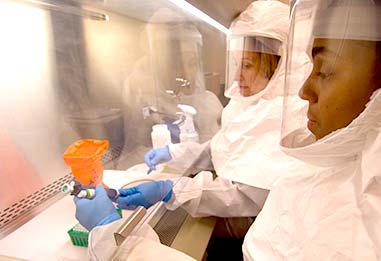
Blog
Blog | 6 min read
March 30, 2020

With the novel coronavirus rapidly spreading across the globe, companies and governments in Greater Richmond, Virginia, are leaning into the fight and are developing new tools, programs and policies to support the region’s economy.
As COVID-19 cases grow throughout the country, Virginia Commonwealth University Health announced it is administering an independently-developed COVID-19 test for inpatients as a pilot program. The in-house test will significantly reduce wait times for results, and in turn, reduce the risk of COVID-19 infection in the community. Testing during the pilot phase has been mostly available to patients requiring hospitalization who present severe symptoms of COVID-19 and is dependent on supply.
“Being able to determine whether a patient does or does not have COVID-19 quickly is of critical importance,” said Christopher Doern, Ph.D., director of microbiology at VCU Health who oversees the implementation of new technologies in the VCU Health clinical microbiology laboratory. “Being able to do that in our own laboratory will be a game changer in how we manage patients with potential COVID-19 symptoms.”
VCU Health aims to obtain same-day results with this testing option, dependent on test volume. While VCU experts develops their method, a Henrico-based company is shipping tests as fast as it can.
GENETWORx will begin shipping at least 800 COVID-19 tests daily to testing sites immediately. The company will be able to increase capacity to 5,000 tests per day beginning in April and as many as 150,000 per month. The CLIA-certified laboratory conducts a variety of diagnostic and clinical testing services but repurposed a portion of its business to rapidly analyze COVID-19 samples.
“The technology we have developed not only allows us to mass produce these much needed COVID-19 tests but also ensures an accurate test result in a timely 24-hour response time from receipt of the sample,” said William Miller, the company’s CEO.
Virginia Commonwealth University researchers began two clinical trials recently on a potential, experimental treatment for COVID-19. Arun Sanyal, M.D., a liver specialist and gastroenterologist at VCU Health, is leading clinical trials of an investigational drug for patients with moderate and severe symptoms of COVID-19 and the virus responsible for the disease, SARS-Cov-2.
“The selection of VCU as a site for this global trial reflects our ability to bring multidisciplinary care to clinical trials and in having the capacity, the breadth and the depth of expertise needed to manage these patients,” Sanyal said.
VCU is one of the handful of institutions in the United States to make these clinical trials available to patients who meet the criteria for this investigational drug. The first randomized, controlled tests in the U.S. began in February.
While medical professionals and consumers alike face disrupted supply chains and emergency preparedness, local manufacturers are stepping up to meet shortages.
While health care workers worldwide respond to the coronavirus outbreak, hundreds of employees at DuPont’s Spruance manufacturing plant in Chesterfield County are working to ramp up production of Tyvek, which helps shield those front-line fighters from the virus.
“Our material is used to make protective garments that provide unparalleled levels of protection, durability and comfort for first responders and front-line workers in this virus outbreak,” said John Richard, vice president and general manager for DuPont Safety, the business division that includes Tyvek.
Hanover-based Anton Paar recently offered its customers a way to verify hand sanitizer recipes using its density meters. The company’s instrumentation products can help prepare concentrations for ethanol and iso-propyl alcohol-based formulations – even those made by your local distillery.
“Everything we make could be used as a cleaning agent,” said Jay Carpenter, who co-founded Reservoir Distillery in Richmond. “Ours [hand sanitizer] is just our distillate — what becomes our bourbon.”
The Richmond-based bourbon whiskey producer has started making what might be called a “hand-crafted hand sanitizer.” It’s a product that distilled spirits businesses are in a unique position to make, given their production process. Carpenter said the liquid sanitizer exceeds the 60% alcohol content typically defined as a sanitizing agent.
The retail, restaurants and hospitality sector has seen the biggest effects from the coronavirus. However, local governments are helping by establishing new programs and policies to support the local businesses in their communities.
Henrico County froze late fees and interest on lodging tax and meals tax payments. Chesterfield and Hanover counties also adopted similar relief measures on lodging taxes. The tax relief measures help hotels and restaurants with cash flow issues.
Richmond Mayor Levar Stoney has proposed an amnesty period on penalties and interest for most local taxes through June 30. However, Richmond City Council meeting was postponed until next month delaying the vote on the Mayor’s proposal. When the Council meets next, it is expected to extend the application period for the city’s real estate tax relief program for seniors and people with disabilities.
In addition to the tax relief measures, Henrico also has announced an initiative to purchase meals from locally-owned restaurants for public safety workers and other essential employees leading the community’s response to the pandemic. Similar programs to help restaurants stay afloat have surfaced in Hanover and Chesterfield counties, too.
Despite the disruption the pandemic has facilitated, Greater Richmond companies and governments alike are adjusting to embrace current market uncertainty. Richmond’s grit and innovation has shown in the first few weeks of the pandemic. And while our region is not immune to this economic downtown, RVA-based Chmura Economics and Analytics recently assessed regions across the country for their vulnerability to this crisis and found the Richmond Region to be less vulnerable than many other regions in the country. The analysis ranked the region at 298 among 384 MSAs based on industries present in the area and expected job losses.
Along with our public and private sector partners, the Greater Richmond Partnership has planned and is ready to facilitate our part of the economic recovery the region will experience.